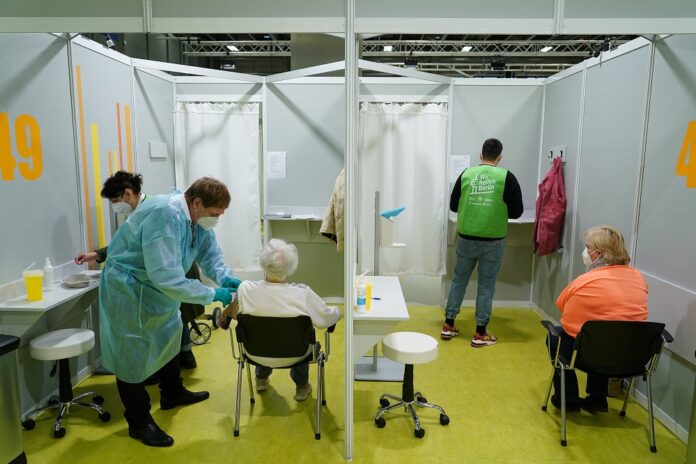Elderly people are inoculated against the coronavirus disease on the opening day of a vaccination centre at the Messe Berlin trade fair grounds in Berlin, Germany January 18, 2021. – Reuters pic
FRANKFURT, Nov 4 — Germany is experiencing a “massive” pandemic of the unvaccinated, Health Minister Jens Spahn said Wednesday, calling for curbs targeting those not inoculated to tame a resurgence in Covid cases.
The fourth wave is raging “with exceptional force”, Spahn said.
“We are currently experiencing mainly a pandemic of the unvaccinated and it is massive,” he told reporters, warning that “in some regions in Germany intensive care beds are running out again.”
Germany, the EU’s most populous country of some 83 million people, has been grappling with a fourth wave of Covid-19 cases in recent weeks that has pushed up the seven-day incidence rate to highs not seen since May.
The country added 20,398 cases over the past 24 hours, according to the Robert Koch health institute, while another 194 people died.
Outgoing Chancellor Angela Merkel, who has called the coronavirus trend “very worrying”, signalled she was in favour of stricter curbs focussed on the unvaccinated.
“If the pandemic situations in hospitals worsens… then further restrictions for unvaccinated people are possible,” Merkel said through her spokesman Steffen Seibert.
The number of Covid patients in intensive care on Wednesday climbed to 2,226, up almost 26 per cent on the previous week to reach the highest level since early June, according to Germany’s DIVI registry.
Booster plea
More than 66 per cent of the population is fully vaccinated, but a recent survey showed that the vast majority of Germany’s still unvaccinated adults have no intention of getting inoculated against Covid.
“For the unvaccinated, the risk is high that they will become infected in the coming months,” warned RKI chief Lothar Wieler, speaking alongside Spahn in Berlin.
Spahn called for more thorough checks at establishments or events where only those who can show they have been vaccinated, recovered from Covid or recently tested negative are allowed to enter.
In hard-hit regions, he said, access should be limited to those who are fully vaccinated or can show proof of recovery — a system that excludes the unvaccinated and is known as “2G” in Germany.
“It’s nothing to do with vaccine bullying,” he said, “but with avoiding an overloading of the healthcare system”.
He also recommended a bigger push on booster jabs, saying the current pace “is insufficient”.
Spahn’s plea for all vaccinated Germans to get a third jab after six months is however at odds with the nation’s STIKO vaccine commission, which for now is only recommending booster shots for the elderly and certain at-risk groups.
For the elderly, getting a booster was urgent, said Leif Erik Sander, who leads a research group on infection immunology at Berlin’s Charite hospital.
“Our studies show that around 40 per cent of people above 70 no longer have neutralising antibodies against the Delta variant six months after their vaccination,” he warned.
Patchwork
The Covid surge comes as Germany is in political limbo following September’s general election, with the winning Social Democrats hoping to have a new coalition government in place by early December.
The incoming coalition parties have however reiterated that there will be no mandatory Covid jabs and no new lockdowns — at least not for the vaccinated.
Merkel’s outgoing chief of staff Helge Braun called for an urgent meeting between the caretaker federal government and the regional leaders of Germany’s 16 states to discuss the Covid surge.
Under Germany’s federal system, regional states have significant powers to decide their own Covid approach, at times leading to a confusing patchwork of regulations.
The southwestern state of Baden-Wuerttemberg on Wednesday introduced new rules in response to the fourth wave, after breaching a self-imposed threshold on occupied intensive care beds.
Unvaccinated adults in the state must now show a negative PCR test for many activities, including indoor dining and entry to cinemas, museums or gyms. The tests can cost upwards of EUR50 (RM240).
The eastern state of Saxony aims to unveil tougher restrictions on Friday.
Under its proposed “2G” plans, unvaccinated people would be excluded from indoor dining, leisure facilities as well as bars and nightclubs. — AFP


